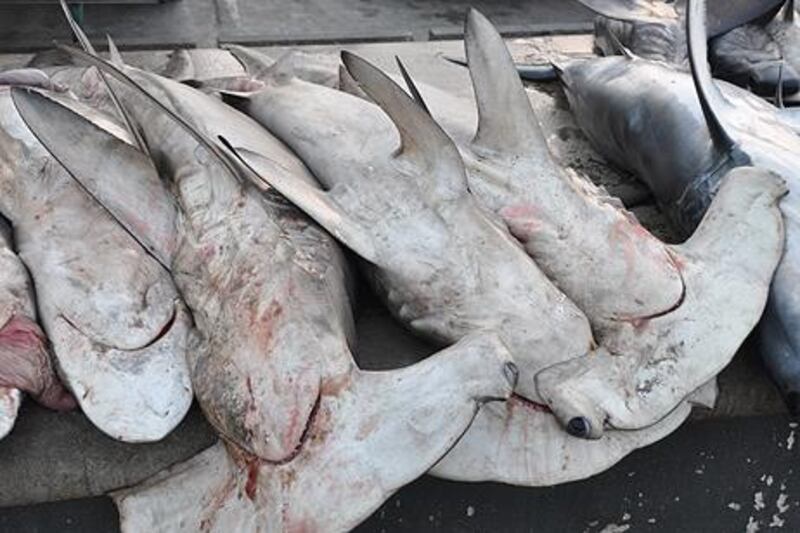DUBAI // The international trade in endangered hammerhead sharks could become regulated for the first time under plans to be outlined at a conservation event this week.
The trade in the sharks - sold at Deira Fish Market - could even be banned if scientific studies find populations are being severely reduced by fishing.
At present there are no controls on the international trade of three types of shark covered by the proposal - the great, scalloped and smooth hammerheads.
Last month, The National reported that threatened shark species were being sold in large numbers at Deira for their fins, which are used to make soup. The trade is legal.
The three hammerhead species in the proposal are among those regularly sold at the market. The great and scalloped sharks are officially classified as endangered, while the smooth species is threatened.
Delegates at this week's Shark Conservation in Arabia workshop in Dubai will be urged to back a move to increase the protection given to the sharks.
A decision on the plan will be made at a Convention on International Trade in Endangered Species (Cites) conference in Bangkok in March. If the proposal is passed, the international trade in the three species would become tightly controlled. Export permits would be needed to transport the sharks and products made from them between countries.
This would affect the Deira market as many of the hammerheads sold there come from Oman, and most of the fins are exported to China. The UAE is the world's fifth largest exporter of shark fins.
Permits would be issued only if the specimen were legally obtained and the trade was not detrimental to the survival of the species. However, Cites regulations do not apply to domestic trade.
"International trade would be illegal if the hammerheads at Deira came from areas where they should not be caught," said Dr Ralf Sonntag, a shark expert at the International Fund for Animal Welfare (Ifaw).
"If, say, Oman can produce a document showing fishing is not detrimental for the shark, that there is science showing they have lots of hammerheads, then it is allowed. If that is not the case then this trade should be stopped."
But there is a lack of data about hammerhead populations in the region, so research would have to be carried out to determine their status.
The aim of the proposal is to prevent the devastation of hammerhead populations that has happened elsewhere. Conservationists say the population in the Mediterranean has fallen 99.99 per cent from its original level.
"These three species are all under threat," Dr Sonntag said. "There are no exact figures for the numbers in this region, or many other regions, but the population is massively under pressure.
"It would be very important to protect them so they can recover. It would help save them."
Dr Elsayed Mohamed, Ifaw's Middle East regional director, said: "If we continue catching sharks without regulation and monitoring we will lose some species."
Over-fishing to meet the booming demand for fin soup, which is regarded as a rare and prestigious delicacy in China, is the biggest threat to sharks.
The global shark-fin trade has been estimated to be worth as much as US$1.2billion (Dh4.4bn), but the rest of the carcass is of little value. It is estimated that more than 70 million sharks are killed each year for their fins.
Ifaw is staging the workshop in partnership with the Ministry of Environment and Water and Sharkquest Arabia.
The four-day event, which starts tomorrow, will be attended by government officials from across the region as well as scientists from both the region and beyond. Only invited guests will be able to attend.





